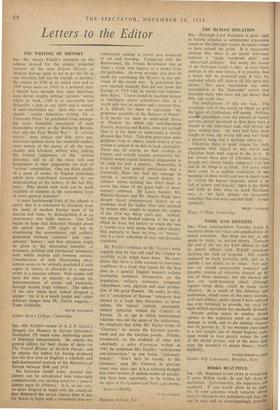THE HUMAN SITUATION
SIR,—Although Lord Hailsham is quite right in feeling irritated at sentimental arguments based on the hydrogen bomb, he seems rather to have missed the point. It is reasonably obvious that there is no moi.al difference between a single murdered child ' and
pulverised. millions.' But surely the lesson
of the hydrogen bomb is this: at some time, perhaps in the near future, it is possible that a bomb will be produced and, it may be, exploded which will destroy all life upon this planet. Not mass destruction but utter annihilation is the Damocles' sword that threatens men, who have not yet shown that they can avoid war.
The implications of this are vast. . The corporate soul of the world, to which we give the name of Civilisation, will perish. Politics, scienie, journalism, even the pursuit of beauty and art, except insomuch as they, have been a benefit to the individual soul, will appear as mere wasted time. All wars will have been fought in vain; the world will end with both a physical bang and a spiritual whimper.
Therefore there is good reason for both pessimism with regard to this world and Christian hope with regard to the n.xt. It has always been part of Christian doctrine, though not always loudly expressed, that the end of all things is at hand. For tho ie who have come to a sudden realisation of the meaning of these words and are in doubt how to ' accept the human situation, which is so full of misery and tragedy' there is the Bible and faith in Him who, as Lord Hailsham says, is no fairy prince, no irnaeinary redeemer, but real man and real God.'- Yours faithfully, BRIAN Coi I Ni sN King's College, Cambridge










































 Previous page
Previous page